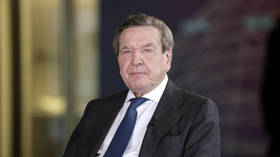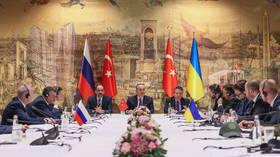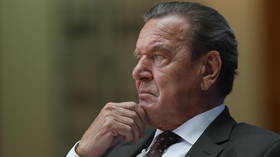German ex-chancellor suggests way to end Ukraine conflict

A ceasefire between Russia and Ukraine is possible, Germany’s former chancellor, Gerhard Schroeder, told several German media outlets following his visit to Moscow last week. The Kremlin wants to resolve the conflict through talks, the politician added in an interview published on Wednesday.
A recent “initial success” achieved at the negotiations in Istanbul on grain exports can be exploited to gradually reach a ceasefire, Schroeder told Germany’s Stern magazine and the RTL/ntv broadcaster. In July, Russia and Ukraine signed a package of documents aimed at unblocking Ukrainian agricultural shipments stuck at Black Sea ports amid Russia’s military operation, following negotiations that also involved Turkey and the UN. In addition, Moscow and the UN signed a separate memorandum aimed at easing sanctions on Russian agricultural produce.
"The good news is that the Kremlin wants a negotiated solution," Schroeder said. At the same time, the former chancellor warned against “denigration of possible concessions by Ukraine as a Russian 'dictated peace' in advance,” calling it a “big mistake.”
The former chancellor also believes that a compromise can still be reached on the fate of Donbass and Ukraine’s neutral status. He called it a “wise decision” by then-chancellor, Angela Merkel, and former Foreign Minister Frank-Walter Steinmeier, not to agree to Ukraine’s accession to NATO back in 2008. Kiev could use an “alternative” that would not involve NATO membership, as Austria has done.
Schroeder acknowledged that the issue of Donbass is a complicated one, and that instead of guaranteeing greater autonomy to the region, Kiev continued to crack down on the rights of the local population. “A solution based on the Swiss cantonal model will have to be found," Schroeder believes. The former chancellor, however, expressed doubt as to whether Russia will agree to return to the “contact line” drawn before February 24.
Schroeder went on to sharply criticize Kiev’s plans to take back Crimea by force, saying: “an idea that Ukrainian President [Volodymyr] Zelensky will militarily reconquer Crimea is absurd.” Instead, tensions around the peninsula that re-joined Russia following a referendum back in 2014 could be “solved over time,” he suggested, expressing his hope that it would not require “over 99 years like in Hong Kong” but would take place during the life of “the next generation.”
The former German leader also highly praised the mediating role of Turkish officials, saying they are “currently very helpful in negotiations about grain shipments.” However, no talks can be successful without a positive contribution from the US, Schroeder believes.
“It won't work without a ‘Yes’ from Washington," he explained.
In the same interview, Schroeder also suggested launching Russia’s Nord Stream 2 gas pipeline as a way to overcome the energy crisis. The “simplest solution” is right there, he said, adding that Germany would have to “bear the consequences” if it abandons this option.
The former German chancellor, who has been heavily criticized at home over his close ties to Moscow, defended his friendship with Russian President Vladimir Putin. “Would [my] personal distancing from Vladimir Putin really do anyone any good?” he asked rhetorically. “I made decisions, and I stand by them, and I made it clear: maybe I can be useful again. So why should I apologize?"













